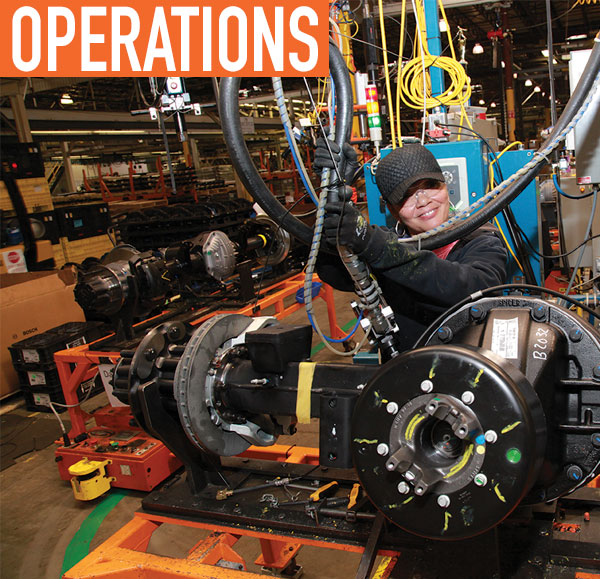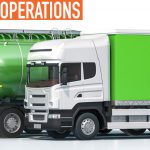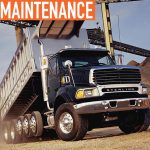The Guthrie brothers are excited as they walk the floor of their 220,000-sq-ft chassis assembly plant they established on the east side of Detroit in 1999. Their company, Detroit Chassis LLC, employs hundreds of workers who turn out RV and commercial truck rolling chassis for Ford Motor Company, and their margin for error in the unforgiving world of auto manufacturing is as slim as ever.
But buoyed by hot products built for a fast-changing commercial truck market, Michael and Carlton Guthrie are confident that Detroit Chassis will keep doing what has long seemed impossible: sustain a niche and deliver outstanding performance with a unionized, urban workforce in the heart of industrial America.
The hottest product the company makes is the F-59 chassis for Ford’s popular commercial package delivery truck. The F-59 is derived from the Ford F-53 Class A Motorhome chassis built by Detroit Chassis since 1999. Detroit Chassis has built the F-59 chassis since June 2010, and demand has grown throughout that period—largely due to demand by fleet buyers.
WHAT’S TO COME
“The commercial truck industry is in the midst of rapid change. We’ve seen an explosion in package delivery options, driven by increased internet buying,” Michael Guthrie says. “There’s been a huge increase in the number of vehicles needed to deliver more frequently and for shorter distances. That has caused companies to look at smaller, more efficient vehicles to service those needs.”
Carlton Guthrie proudly adds that Detroit Chassis is an industry leader when it comes to building platforms for delivery trucks. “In fact, we have a dominant market share in the front-engine gas Class A segment. It’s approaching 100%,” Guthrie says.
But Detroit Chassis’ original product, the Ford F-53 chassis for RVs, is still going strong, and it will get upgrades for the 2020 model year that are also planned for the F-59 chassis. Production that features Ford’s latest electrical architecture, including its Collision Avoidance and Driver Support System (CADS) option, begins in December 2019 for delivery in early 2020. New offerings feature forward collision mitigation (FCM), lane departure warning (LDW), and auto-high beam. Also fresh for both the F-53 and F-59 is an all-new 7.3-L V8 engine.

HOME ADVANTAGE
Finding and maintaining an industry niche has been an imperative since the Guthrie brothers founded the company 20 years ago. After previously owning a metal stamping company and tool-and-die shop, they searched for an opportunity not so reliant on the purchase of high-cost raw materials. That opportunity emerged during talks with Ford, Detroit Chassis’ biggest customer. Ford was building its F-53 motor home chassis in Mexico, but was spending large amounts to ship the frames to US assembly plants and to send powertrains, axles, and transmissions from the US to Mexico for final assembly.
The Guthries asked: Why not build the chassis in the US by establishing a competitive advantage in quality, cost, and delivery over the south-of the-border competition? And why not do it in Detroit, which had been ravaged for too long by the flight of manufacturers?
“Ford Motor Company and its Ford Land division wanted to see a successful Ford investment in the city of Detroit, and we became a conduit for that,” Carlton Guthrie says. “We concluded that if we could design a state-of-the art, lean, chassis assembly plant, we would be able to successfully compete with cheap Mexican labor. That’s exactly what we did.”
“We created what we call a Tier Zero opportunity,” Michael Guthrie says. “That is, in the Ford system, we are a Ford assembly plant with Ford assembly plant systems on site, and we build to OEM standards. But we’re privately owned—(fully independent). That is unique in the North American automotive sector,” he says.
The Guthries reached an operating agreement with Ford in 1998. With the help of Ford Land, it broke ground on its current 33-acre site in January of 1999. Production began in November 1999, with a 300-person workforce. Many of the company’s original employees are still part of the team.
Detroit Chassis—which first operated as Trumark Inc—built the F-53 chassis from the start. It also built two products that were discontinued: a street legal electric vehicle (LSV) electric car for short distances, known as the Think Neighbor, and a US Postal truck chassis derived from the right-hand drive Ford Explorer.
Throughout its existence, an innovative plan for training and managing city residents—some of whom have held their first jobs at Detroit Chassis—has been imperative. The company found that employing or contracting on-site social workers who helped employees manage their concerns with childcare, transportation, and even housing has been transformative.
“Everyone says their people are their most important resource or most valuable asset, but it was absolutely essential for us because we build niche products at lower volumes,” Michael Guthrie says. “We could not afford to invest in high-priced automation to reduce labor. We had to invest in labor and make it flexible, agile, and dependable.”

SHIFTING GEARS
Detroit Chassis has prepared for sweeping changes and the resulting opportunities in the transportation sector by building and developing its management team. It has installed a new president and hired several senior executives with decades of experience in commercial truck product development and manufacturing complex assemblies to augment an established management team. A growing demand for commercial trucks powered by alternative energy and better fuel efficiency has once again created intriguing niche opportunities for Detroit Chassis.
“Companies like UPS, FedEx, and Aramark—companies that have fleets of vehicles—are very aggressively looking at which of their routes are best served by an electric, alternative chassis,” Dennis Edwards, Jr, Detroit Chassis president, says. “And, everybody loves the Ford chassis. That puts us in the crosshairs of those folks looking for that kind of resource.
“We recognized a sweet spot for alternative powertrains that were being produced in the aftermarket,” Edwards continues. “We saw that our gas-powered chassis are being converted, and we want to take advantage of that trend.”
Detroit Chassis is actively working with technology developers of low-emission and zero-emission systems to integrate, install, and market their packages on a scaled-down version of the F-59 chassis. The first of such products will be delivered in mid-2019.
Detroit Chassis sees an almost unlimited market for a more flexible chassis product created by increased demand from commercial truck customers. It is also streamlining the supply chain for Tiffin and other top RV companies. In a big anniversary year, the firm hopes every innovation solidifies its hard-won reputation as a valued collaborator for OEM and aftermarket clients.
FOR MORE INFORMATION
Founded by entrepreneurs Michael and Carlton Guthrie, Detroit Chassis is part of the SPECTRA group of companies. Originally known as Trumack Assembly, Detroit Chassis operates as a tier one supplier. Detroit Chassis, in conjunction with its sister company Detroit Custom Chassis, continues to develop the capacity and the capability to provide process engineering, design, and niche vehicle assembly services. SPECTRA and its Detroit Chassis affiliates are positioned to expand their services to industries across America and beyond with engineering, sub-assembly capability, and specialized logistics for efficient production. Find out more, visit www.detroitchassis.com.
MODERN WORKTRUCK SOLUTIONS: FEBRUARY 2019 ISSUE
Did you enjoy this article?
Subscribe to the FREE Digital Edition of Modern WorkTruck Solutions magazine.





